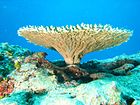Euphyllia glabrescens
| Euphyllia glabrescens | |
|---|---|

| |
| Scientific classification | |
| Domain: | Eukaryota |
| Kingdom: | Animalia |
| Phylum: | Cnidaria |
| Class: | Hexacorallia |
| Order: | Scleractinia |
| Family: | Euphylliidae |
| Genus: | Euphyllia |
| Species: | E. glabrescens
|
| Binomial name | |
| Euphyllia glabrescens Chamisso & Eysenhardt, 1821
| |
| Synonyms | |
|
List
| |
Euphyllia glabrescens is a species of large-polyped stony coral belonging to the family Euphylliidae.[2] Its common name is the torch coral due to its long sweeper tentacles tipped with potent cnidocytes.[3] It is a commonly kept species in the marine aquarium hobby, particularly specimens from Indonesia and Fiji, who fulfilled annual export quotas of 28,000 and 6,000 pieces, respectively, in 2005.[4]
Description
[edit]Euphyllia glabrescens is a colonial coral with a phaceloid formation of corallites 20–30 millimeters (0.8 – 1.2 inches) in diameter and spaced 15–30 millimeters (0.6 – 1.2 inches) apart. Walls are thin, with sharp edges. Polyps have large tubular tentacles with knob-like tips.[5] It can be a number of colors, and is often bicolored with contrasting tentacles and polyp tips.
-
Green, yellow tipped
-
Beige, green tipped
-
Beige, white tipped
Distribution & habitat
[edit]This is a widely distributed species, rare to the Red Sea and the Gulf of Aden, while uncommon through the northern Indian Ocean, the Persian Gulf, the central Indo-Pacific, Australia, Southeast Asia, southern Japan and the East China Sea, Micronesia, and American Samoa.[4]
Euphyllia glabrescens can be founds in depths of 1 to 35 meters (3 – 115 feet) in a wide range of reef environments [4]
References
[edit]- ^ Turak, E., Sheppard, C. & Wood, E. 2008. Euphyllia glabrescens. The IUCN Red List of Threatened Species. Version 2016.1.
- ^ "WoRMS - World Register of Marine Species - Euphyllia Dana, 1846". www.marinespecies.org. Retrieved 2024-03-06.
- ^ Jones, A. M. (2011). "Raiding the Coral Nurseries?". Diversity. 3 (3): 466–482. doi:10.3390/d3030466.
- ^ a b c International Union for Conservation of Nature and Natural Resources (2014). "Euphyllia glabrescens". doi:10.2305/IUCN.UK.2014-1.RLTS.T133256A54224297.en.
{{cite journal}}: Cite journal requires|journal=(help) - ^ Australian Institute of Marine Science (2013). "Euphyllia glabrescens". Corals of the World. Retrieved 23 July 2016.






